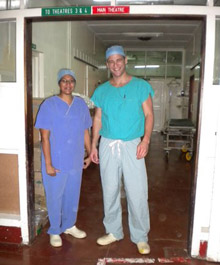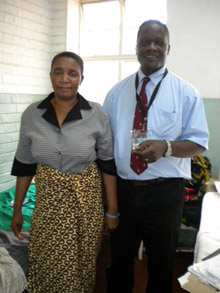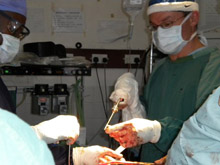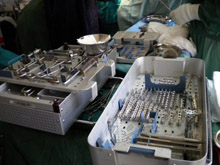Alumna Delivers Orthopedic Implants to Developing World
-
-
slice.mit.edu
- 3
Filed Under
Recommended

Every day in the U.S. orthopedic surgeons use basic trauma plates and screws to set and repair fractures in patients' arms, legs, and other bones. But in the developing world, where this equipment is often not available, a broken arm can mean the difference between a family's breadwinner being able to work or not. And, because surgeries are infrequent, new doctors can't be adequately trained. When orthopedic surgeon Dheera Ananthakrishnan ’90 learned from company reps that a surplus of first-generation orthopedic implants sat gathering dust in warehouses, she decided to do something to unite obvious demand with abundant supply.
Having studied mechanical engineering at MIT, the logistical problem appealed to Ananthakrishnan. She joined with orthopedist Jim Kercher and his wife, Heather Kercher, both Georgia Tech-trained engineers, to apply supply chain management principles to the problem. Before long, Orthopaedic Link (OL) was born. It's a nonprofit that uses an online portal to connect idle, usable orthopedic implant surpluses with the surgeons and organizations in the developing world that need them.

Recipient hospitals and doctors, though, are fully evaluated before they can receive supplies. "We're trying to find surgeons with a good skill set who are limited mainly by a lack of supplies, in developing countries that are politically stable," Ananthakrishnan explains. She seeks doctors already providing services for free and who are looking to train other doctors and students. She herself personally visits sites to observe surgeries and understand the needs of a hospital. Ananthakrishnan and her team also follow up with the doctors and patients to gather feedback about the efficacy of the donated equipment.
Success story—Philippines The government hospital Davao Medical Center (DMC), the only hospital in the Philippines that performs charity spinal surgery, houses the best spine surgeons in the region but they lack the implants needed to treat patients. One year after Ananthakrishnan and her partners conceived of OL, in March 2009, patients at DMC were receiving much-needed spinal implants. One patient, Donald Manurong, a 46-year-old coconut picker and sole supporter of nine, fractured his spine after falling out of a tree and was unable to provide for his family. He could have been crippled for life, but after his surgery he is recovering and will soon be back to work. Since OL's visit, doctors have performed nine other spinal surgeries—valuable training for the next generation of surgeons. See photos of Orthopaedic Link in the Philippines (on Facebook) and read a blog post by a resident training there.

Success story—Malawi Last month, Ananthakrishnan helped deliver supplies to treat extremity fractures to two hospitals in Blantyre, Malawi, where the six orthopedic surgeons available to care for the nation's population of 14 million work. One patient, 24-year-old farmer Mafuno Magonja, had fallen off his bike in July and required implants to restore function to his arm. He had been treated with a cast—the only solution available at the time—and his arm had healed in a crooked, nonfunctional position. During OL's visit, Magonja underwent surgery with the appropriate plates and screws and now has a good chance at once again having a functioning forearm. Days after OL left, doctors had already performed eight additional surgeries. View Orthopaedic Link's Facebook page for more photos from the Malawi trip and read the blog post from David Katz, the orthopedic surgery resident who accompanied Ananthakrishnan on the trip.

Challenges to doing good Two of the major hurdles OL has faced has been determining stock and overcoming longstanding corporate strategy. "It's so difficult to estimate how much supply is out there," Ananthakrishnan says. She likens corporate warehouses to home junk closets. "A lot of the effort for us is compelling the companies to try to sort through what's usable and not usable," she says. The other challenge is convincing corporate entities that their implants will be used appropriately and that patients receiving the donations will not sue if there are complications following surgery. This is why there's such a thorough screening process for recipient hospitals and follow-up analysis on all cases, Ananthakrishnan explains. So far, four companies are on board on a small scale: Medtronic, Synthes USA, Stryker Trauma, and DePuy. As a result, these companies haven't had to discard some of their outdated supply or waste valuable storage space, and they have also lessened their tax burdens.
What's next for Orthopaedic Link? They are working to channel outdated products automatically into their supply chain and expand into other parts of Africa, Asia, and possibly Central America. But Ananthakrishnan wants to be careful not to spread the company too thin and bolster the sites in the Philippines and Malawi to make supplies easily replenished.








Comments
Philadelphia L…
Wed, 08/19/2015 10:56pm
Wow, that's really impressive! Rather than let the orthopedic implants sit gathering dust in warehouses, it is so much better to do donate them to those who are in need of implants. Great work! Hope you will be able to help many patients in those developing countries.
<a href="https://www.youtube.com/watch?v=OjskAjJqGLI/" rel="nofollow">Philadelphia Langhorne Hand Specialist</a>
seo hk
Tue, 02/25/2014 2:55pm
Good post. I learn something totally new and challenging on
websites I stumbleupon everyday. It's always exciting to read content from other authors and use something from their sites.
Michael OKeefe
Mon, 11/26/2012 2:08am
I have had a plate and 8 screws removed from my High Tibial Osteotomy operation . I would like to know if you could use them ? I live in Germany and they are the very best quality